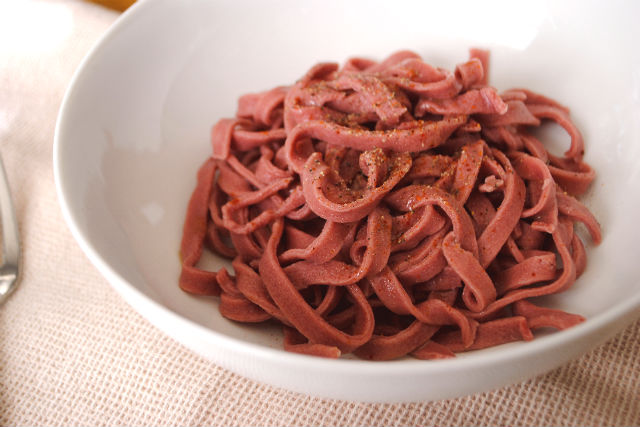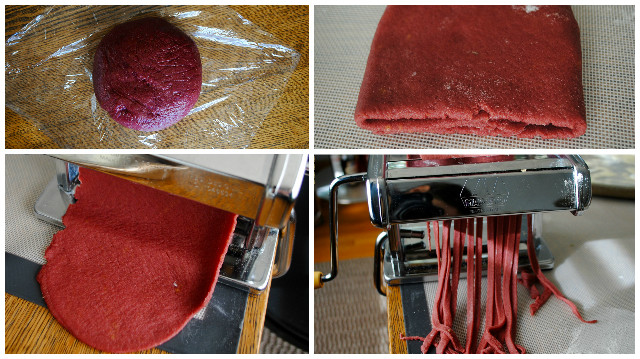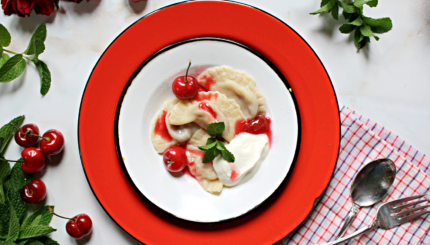It’s February. You’re going about life as usual. Work, eat, sleep. Eat, sleep, work. Eat some more. Then you realize it’s three days before Valentine’s Day. You want to do something special with your significant other this year, and as much fun as falling asleep on the couch in your pajamas is, you’re in the mood for something a little fancier. But oh, woe! There are no reservations to be had! Don’t throw in the towel quite yet, there’s still a way to have a romantic V-Day meal. It involves — gasp — cooking something yourself.
Not only is making your own meal on February 14th an excellent way to avoid losing hundreds of dollars at four-course prix fixe restaurant meals, it’s infinitely more romantic. Which is why I’m here to share a recipe for fresh pasta (festively dyed with wine) that is sure to be a hit with your Valentine.
Making fresh pasta with your significant other can be really fun, but you might want to save that for a day when you’re willing to spend the time cleaning up, post-pasta rolling. There is a simple strategy to making sure you’re not sweating and covered in flour twenty minutes before you intend to eat: I recommend making the pasta before the big day, and storing it in a plastic bag in the fridge until you’re ready to boil. That way, all you have to do with regards to meal prep on the holiday is make a salad or a simple tray of roasted veggies.
For this recipe, you will need a pasta roller, which come as standalone pieces of equipment or as attachments for stand mixers; either will suffice! While any red wine will work in the recipe, I like the bold sweetness that comes from Manischewitz wine for a fun Jewish twist, though I’d recommend sticking to their Concord flavors, as the other more fruity flavors could be a bit strange. The <a href="http://www.amazon.com/gp/product/B0001BGTSA/ref=as_li_tl?ie=UTF8&camp=1789&creative=390957&creativeASIN=B0001BGTSA&linkCode=as2&tag=myjewishlearn-20&linkId=DMAM5SRGUOKZM27W">Red Beet Powder 2 oz.</a>
The Nosher celebrates the traditions and recipes that have brought Jews together for centuries. Donate today to keep The Nosher's stories and recipes accessible to all.

Manischewitz Pasta
This unique pasta dish infuses Manischewitz wine directly into the noodles, adding a subtly sweet and distinctly Jewish twist to a classic staple.
- Total Time: 2 hours 10 minutes
- Yield: Serves 2
Ingredients
- 1 cup Manischewitz wine
- ¼ cup olive oil
- 2 eggs
- 3 egg yolks
- 2 ½ cups semolina flour (plus extra for dusting baking sheets)
- ¾ cup all-purpose flour (plus extra for dusting work surface)
- 2 tsp finely ground kosher salt
- 1 tsp finely ground black pepper
- 2 ½ Tbsp red beet powder (optional, for additional color)
To serve:
- olive oil, chilli flakes, grated cheese
Instructions
- Place wine in a small saucepan and bring to a boil, then reduce to a simmer until liquid is reduced by half. Remove from heat and let cool.
- Sift flour, salt, pepper and beet powder (if using) into a bowl and whisk to combine. Dump onto a clean work surface and make a well in the center.
- Lightly whisk cooled wine, olive oil, eggs and egg yolks, and pour slowly into the well within the flour mixture, working mixture together with a fork or your fingers until completely combined. Use a bench scraper to turn the dough over itself until it forms a shaggy mass.
- Knead dough with the heel of your hand for 3-5 minutes, dusting with flour if dough seems very sticky. Rotate dough and continue to knead until smooth and uniform in color. Cover with plastic wrap and let rest at room temperature for at least 1 hour.
- Set up your pasta maker according to package directions and set up a large baking sheet sprinkled with semolina (or if you’re a professional, set up your pasta drying rack).
- After dough has rested, cut into four pieces. Rewrap the three pieces you’re not using so they don’t dry out. Roll out the piece of dough until it’s about 1-inch thick. Dust with flour and pass through the widest setting on the pasta roller. Fold into thirds and repeat, every few folds switching to a narrower setting until you’ve arrived at setting 2 or 3 with long sheets of dough. Flour both sides of the dough.
- Switch the pasta roller to the linguini or fettuccini setting and set up the baking sheet under the roller. Pass the dough through the roller and onto the baking sheet or drying rack. Repeat previous step with remaining three pieces of dough.
- When you’re ready to cook, bring a large pot of water to boil. If the pasta has fully dried out, it may cook for up to 2-3minutes, but could take as little as 1 minute. Set a timer for 1 minute, then place pasta in water. After 1 minute, begin testing pasta for doneness.
- Drain pasta and serve with olive oil, chilli flakes and grated cheese if desired.
- Prep Time: 1 hour + 1 hour resting time
- Cook Time: 10 minutes
- Category: Dinner
- Method: One-pot
- Cuisine: Holiday





Leave a Comment